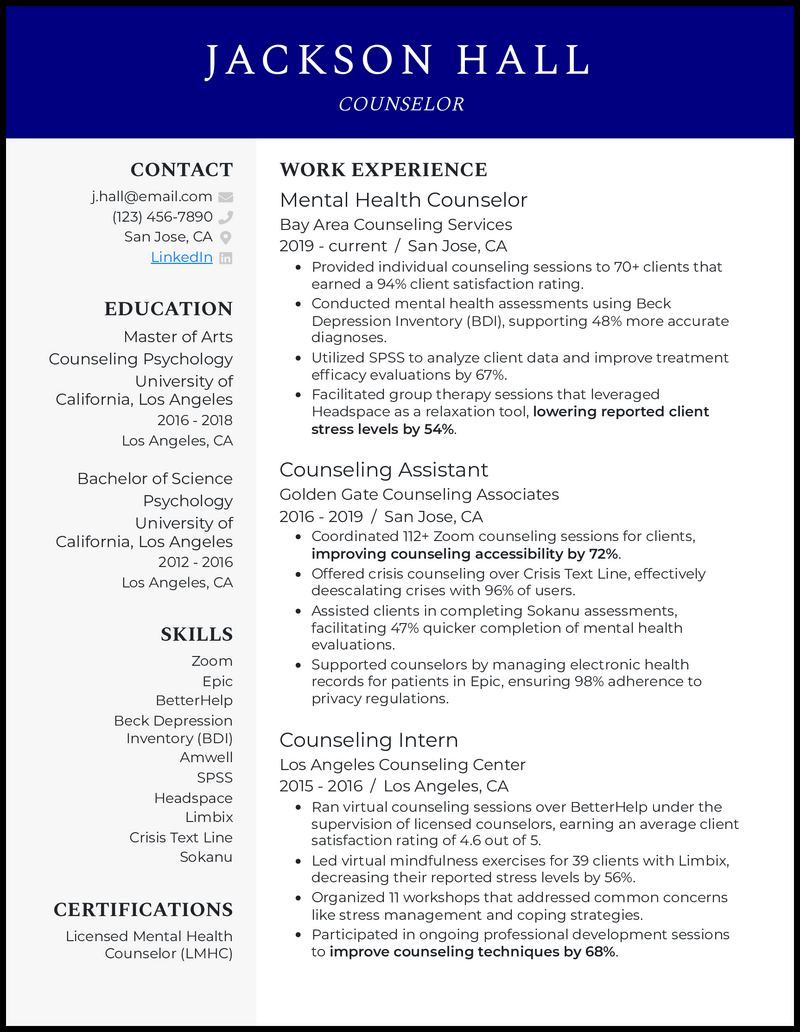Counseling students involves navigating mental health challenges prevalent within school walls. That’s why a school counselor resume that reveals a string of placements in academic institutions goes a long way toward being hired—it shows you’re uniquely experienced in supporting a student population.
- Emphasize how you helped students work through common adolescent struggles to further build your case as a trained school counselor.
Related resume examples
- Camp Counselor
- Social Worker
- Personal Trainer
- Case Manager
- Physical Therapist
Tailor Your Psychology Resume to the Job Description

It’s time to let your psychology skills shine! Recruiters want to know how familiar you are with common digital programs, methods, and soft skills that are core to your profession . . . and to their particular open position.
Revisit the job description for the organization you’ve got your eye on, and look for keywords like “student counseling appointments” or “exposure therapy.” Write down whichever traits you have that overlap with that particular job opening.
Be specific about your skills to demonstrate which psychology niche you work in. Mention abilities specifically connected to your niche alongside the universal must-haves.
Need some starter ideas?
15 popular psychology skills
- Headspace
- TherapyNotes
- SurveyMonkey
- Google Classroom
- Skill Five
- MS Excel
- MS PowerPoint
- Zoom
- PowerSchool
- Skill Ten
- Group Counseling
- Active Listening
- Patient Assessment
- Google Teams
- Goal Organization

Your psychology work experience bullet points
Now, while it’s important for you to revisit the job description frequently for ideas, make sure you don’t just repeat things back to the recruiter! Strive to leverage your own psychology experiences whenever possible, since they’re what make you a standout candidate.
Use active verbs and language to show your enthusiasm for the position. An energetic tone will carry your achievements far, and you’ll be memorable for having great personal traits that mesh beautifully with psychology.
You also need to substantiate your claims to fame with metrics! You can enhance your credibility by including quantifiable measurements of your success, like wellness ratings, improvement percentages, and improved client satisfaction feedback.
- Have your personal ratings as a counselor gone up during the past year? Say so!
- Did well-being percentages climb as a result of your insightful outreach program?
- Reduced instances of crises in your area of expertise demonstrate your efficacy.
- Improved efficiency rates can also show your ability to streamline teamwork.
See what we mean?
- Provided individual counseling services to 184 students, resulting in a 26% improvement in overall wellbeing
- Conducted 42 group counseling sessions addressing bullying and stress, receiving an average group satisfaction rating of 4.7 out of 5 from student participants
- Assisted clients in completing Sokanu assessments, facilitating 47% quicker completion of mental health evaluations
- Ran virtual counseling sessions over BetterHelp under the supervision of licensed counselors, earning an average client satisfaction rating of 4.6 out of 5
- Utilized SPSS to analyze client data and improve treatment efficacy evaluations by 67%
9 active verbs to start your psychology work experience bullet points
- Utilized
- Assisted
- Organized
- Led
- Provided
- Conducted
- Completed
- Guided
- Administered
3 Tips for Writing a Psychology Resume if You’re Low On Experience
- Think creatively about relevance
- Just because a previous job wasn’t related to psychology doesn’t mean it can’t add to your qualifications now! If you’ve exhibited patience and empathy in past roles, like customer assistance, you can translate these experience points for your psychology resume.
- Try a resume objective
- If you write a career objective for your psychology resume, you can fill in some of those “gaps” that come with limited experience. Briefly describe why you’re a good fit for the job, and remember not to repeat yourself later!
- Include internships and academic projects
- If you’re looking to round off your resume, consider whether you completed any internships, classes, or even college group projects related to psychology.
3 Tips for Writing a Psychology Resume if You’ve Got Some Experience Already
- Try a summary instead
- When you have plenty of diverse professional experiences, it can be helpful to tie everything together with a resume summary. Instead of stating your career goals, sum up a few shining traits and notable experiences that qualify you for a job in psychology.
- Use reverse-chronological formatting
- When you lay out your experience section, place your most recent experiences first. This will enable you to establish a clear growth trend throughout your career and wow the reader immediately.
- Leave out unrelated jobs
- If you have plenty of experiences in your professional history to choose from, stick to a few jobs and nix any that don’t relate to psychology. Leave out any irrelevant jobs that don’t reinforce your counseling abilities.
Should I include any certifications?
Oh, absolutely! If you have a Certified in Hospital Psychology (CHP) or Board Certified Specialist in School Psychology certificate, make sure you include a certifications section for them.
How do I keep my metrics interesting?
Many success metrics are calculated in percentages, sometimes resulting in a redundant-sounding list if you aren’t careful! Try to use a variety of metrics by pulling in things like star ratings and keep your context fresh.
Which template should I use?
While any of our three resume templates can provide you with a great starting point, you may want to pick the one that makes your experience look the most impressive! But, if your skills are your strongest selling point, consider the layout that emphasizes those.











![]()